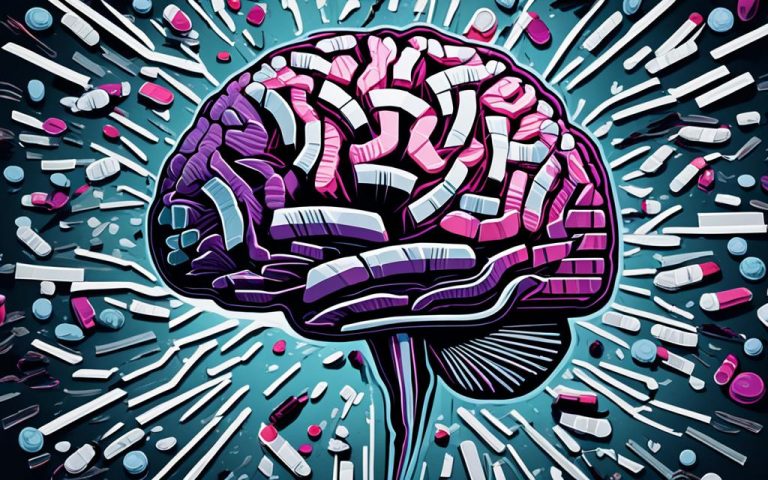How ChatGPT Impacts Psychology: Exploring New Frontiers
ChatGPT is a top-notch natural language processing tool. It’s changing the game in AI psychology. This smart AI is leading us into unknown areas of cognitive science and mental health applications.
Exploring the impacts of ChatGPT on psychology puts us at a turning point. This AI tool could change psychological studies, therapy, and how we understand the mind.
ChatGPT’s influence range from chatbot therapy to ethical AI development. It also covers AI bias mitigation and the psychology of human-machine communication. These areas present new chances for us to explore, needing our careful attention.
We have to keep an open mind while stepping into these new areas. Using its power wisely and overcoming its tough parts are crucial. This mindset is key as we move forward.
Key Takeaways
- ChatGPT is a groundbreaking natural language processing technology that is revolutionizing the field of AI psychology.
- It offers new frontiers in human-AI interaction, cognitive science, and mental health applications.
- The rise of conversational AI like ChatGPT has significant implications for psychological research and therapy.
- Exploring the potential of ChatGPT requires addressing ethical concerns, such as AI bias mitigation and responsible development.
- Understanding the psychology of human-machine communication is crucial for leveraging ChatGPT’s full potential.
The Rise of Conversational AI
Artificial intelligence (AI) is growing fast, especially in the area of conversational AI. This new technology is changing how we talk to machines. It has introduced natural language processing (NLP). NLP shaped the world of chatbots and virtual assistants. It’s also changing how we think about interacting with AI.
Understanding Natural Language Processing
Natural language processing (NLP) is the core of conversational AI. It’s a part of AI that lets machines understand and use human language. Using advanced algorithms and machine learning, NLP lets computers read, speak, and write like us. This makes talking to machines feel more natural.
Chatbots and Virtual Assistants
Thanks to NLP, chatbots and virtual assistants are now everywhere. These tools mimic human conversation. They can understand what we mean and respond accurately. This technology is changing the game in customer service, marketing, and personal help.
Conversational AI keeps improving, offering new chances in cognitive science. It helps experts study how we interact with AI. By understanding this better, we can improve AI’s role in our lives. So, experts are breaking new ground in AI psychology.
Psychological Implications of Human-AI Interaction
AI systems like ChatGPT are getting smarter, leading to interesting psychological implications when humans interact with them. This interaction creates a new area, where tech and psychology mix. The boundaries we thought we knew are rapidly changing.
Anthropomorphism and Emotional Bonds
The way we see AI as having human-like traits is called anthropomorphism. When we talk to AI like ChatGPT, we might start to feel like it’s a friend. This connects to emotional bonds people develop with the AI.
The more advanced AI systems become, the greater the risk of users developing unrealistic expectations or emotional attachments, blurring the line between reality and fantasy.
Trust and Transparency in AI Systems
Even as we develop emotional ties, trust and transparency with AI systems are key. It’s crucial for users to know what ChatGPT can and can’t do. Remember, it’s just a highly skilled language model, not a being with feelings.
- Fostering trust through transparency about the AI system’s capabilities and limitations.
- Educating users on the boundaries of human-AI interactions to maintain realistic expectations.
- Encouraging responsible engagement with AI to promote ethical AI development.
As we move forward with human-AI interaction, finding a way to use AI’s potential safely is vital. We must consider how we communicate with machines. Learning more about it will help guide the future of this technology.
ChatGPT and Cognitive Science
ChatGPT, an AI language system, has changed the game in cognitive science. It gives us a fresh way to dive into how humans think and process language. Also, it helps us understand how we make decisions.
With its natural language skills, ChatGPT lets experts see how people talk to AIs. This shows us a lot about how humans and computers understand each other. By looking at how we chat, scientists learn more about how we understand language and solve problems.
ChatGPT’s talks can also help in studying how we communicate. It helps us understand how we imply things, analyze discussions, and make guesses. This can show us a lot about how we use words.
ChatGPT’s skills in language are sparking new paths in studying the brain and language. It lets us dig into how we think and talk like never before.
Moreover, ChatGPT’s talks can teach us about making decisions and logic. By comparing its answers to ours, we learn more about our thinking process. This helps us understand how we solve issues and make choices.
- Investigate language comprehension and production processes
- Study pragmatics and discourse analysis in human-AI interaction
- Explore cognitive aspects of decision-making and reasoning
- Analyze user behavior and conversational patterns
As cognitive science grows, AI like ChatGPT offers huge promises. It helps us get deep into the human mind. Using AI and psychology, we can do more in mental health and learn a lot more about thinking.
ChatGPT in Mental Health
ChatGPT is a new, advanced conversational AI. It’s making waves in the field of mental health. This tech opens doors to new frontiers in AI psychology and chatbot therapy.
Psychological Theories and ChatGPT
ChatGPT can chat in a natural way. This skill improves psychological theories. It can even use CBT techniques in its chats. This way, it gives personalized support to people.
Data from ChatGPT can also help create new theories. This adds to what we know about human behavior and thoughts.
Potential Applications in Mental Health
The possibilities for ChatGPT in mental health are big. It could be a first contact for mental health help. People might find it easier to talk to since it’s always there and doesn’t judge.
ChatGPT might also be great for chatbot therapy. This would offer support all the time, helping people build emotional strength.
Also, ChatGPT could help spread knowledge about mental health and ways to prevent problems. By sharing accurate info and chatting with people, it could fight the stigma. It would also promote taking care of oneself.
Still, adding ChatGPT to mental health help needs care and ethical AI rules. Even though it shows a lot of potential, it can’t replace seeing a mental health professional. It should be a support, not the only solution.
By carefully using ChatGPT in mental health, we could change how we support mental health. It could make mental health help more open and available to everyone.
Ethical Considerations in AI Development
AI is growing fast and touching many areas, such as psychology. It’s key to think about ethics and how we use it. Powerful AI, like ChatGPT, brings new opportunities but also challenges us with issues of bias, fairness, and being ethical.
Addressing Bias and Fairness
AI can pick up and spread unfair biases if we’re not careful. This is a big worry when using AI in psychological work. We need to check and fix any biases in AI really well to protect people’s mental health.
Testing AI systems thoroughly and keeping an eye on them helps to catch and fix any biases. This effort is crucial in making sure AI treats everyone fairly.
Responsible Use of AI in Psychology
AI in psychology has a lot of promise but also requires us to be responsible. Using AI in ways that put people’s wellbeing first and respect their privacy is essential. It should help human experts in psychology, not replace them.
Setting up guidelines for how AI is used in psychology is crucial. This ensures AI supports but doesn’t take over the work of human professionals. It’s about working together wisely.
Let’s keep talking, working together, and talking with the public about AI and psychology. It’s through these efforts that we can use AI wisely, keeping important ethical values at the core of what we do. Doing so protects the mental health and wellbeing of those we care for.
The Psychology of Human-Machine Communication
Advancing AI tech, such as ChatGPT, makes studying human-machine communication vital. It explores how we understand and react to AI’s responses. This gives us clues on user experiences and how to make AI more welcome.
Interpreting AI Output
Figuring out what AI’s responses mean to people is key. It involves looking at how the AI talks and the situation to grasp its point. What we already know, our biases, and how we feel can change how we see the AI’s words.
Responding to AI
How we react to AI’s chatter is crucial in our talks with them. Some people trust and engage with AI, while others might be skeptical. This depends on how much they trust the AI. Studying these reactions teaches us a lot about the mind games between people and AI.
People might treat AI like it’s human. This can affect how we see what AI says. It underlines the need for clear and honest designs with AI.
| Factor | Impact on Interpretation | Impact on Response |
|---|---|---|
| Prior Knowledge | Influences how users contextualize and make sense of AI output | Shapes expectations and openness to engaging with AI |
| Cognitive Biases | Can lead to misinterpretations or selective attention to certain aspects of AI output | May result in dismissal or overreliance on AI recommendations |
| Emotional State | Affects the perception and processing of AI-generated content | Can impact the level of trust and willingness to act on AI suggestions |
Knowing more about how humans and AI talk can help us create better AI. AI that interacts in more useful and truthful ways. This is key in using AI well in many fields.
Integrating ChatGPT into Psychological Research
The field of psychology is evolving fast. Researchers are using new tech to improve their work and learn more. They are now using ChatGPT, an advanced AI psychology tool, in their psychological research.
Data Analysis and Hypothesis Testing
ChatGPT can understand and process a lot of data. It’s great for data analysis and hypothesis testing in psychology. Researchers find patterns and test ideas more easily and accurately with it.
Virtual Experimentation and Simulation
ChatGPT is also used for virtual experimentation and simulation. It creates realistic virtual worlds. This lets researchers test ideas and study complex psychological topics in ways not possible before. They can get important insights without causing real harm.
It can also talk about cognitive science. This is great for researching how people and AI interact. This gives us insights into how these interactions affect us psychologically.
| Traditional Research Methods | ChatGPT-Enabled Research Methods |
|---|---|
| Limited by physical constraints | Virtually unlimited scenarios |
| Potential ethical concerns | Ethical safeguards built-in |
| Time and resource-intensive | Efficient and cost-effective |
With ChatGPT, psychological research is reaching new heights. Scientists are discovering more about how our minds work. They are advancing our knowledge of human behavior. These discoveries are exciting and meaningful.
Future Directions in AI Psychology
AI and psychology are merging to change mental health care. Technologies like ChatGPT are making therapy more personal. They offer real-time advice and support based on each person’s needs.
Enhancing Therapist-Client Interactions
ChatGPT can help therapists by understanding how their clients feel and think. These AI assistants use psychology to suggest the best ways to talk to a client. By working together, therapists and AI can build stronger relationships with clients, leading to better mental health results.

Personalized AI Assistants in Mental Health
In AI psychology, creating AI friends for mental health is a key area. These AI helpers will give tips, exercises, and comfort any time. They’re designed to be caring and follow strict psychological guidelines, making mental health help available to more people.
We must be careful with how we use and develop these AI systems. The focus should be on being ethical and protecting privacy. It’s also important to make sure AI assistants don’t take the place of human therapists, but rather support them in helping people.
| Potential Benefits | Ethical Considerations |
|---|---|
|
|
Building the future of AI in mental health needs teamwork. Developers, psychologists, and therapists need to work together. This mix will lead to better use of technology for improving mental well-being.
Conclusion
The arrival of ChatGPT marks a new chapter in AI psychology and human-AI interaction. This natural language processing technology changes the game for cognitive science, mental health applications, and our view on the psychology of human-machine communication. It’s critical to focus on chatbot therapy, ethical AI development, and AI bias mitigation. This is key for its responsible use in psychology.
ChatGPT can chat like a real person and offer custom answers. It has kicked open the door for enhancing therapist-client interactions and making personalized AI assistants in mental health. Its power to review data, test ideas, and run virtual tests is huge. It’s a major advance in integrating ChatGPT into psychological research. This boost our know-how on how humans think and act.
We’re in new waters, needing to think deeply about ethical considerations with ChatGPT and psychology. Being clear, spotting biases, and earning trust in AI are crucial steps. They’ll guide its careful use in lots of psychological areas. By welcoming ChatGPT and dealing with its issues, we create a new path. Here, AI psychology changes how we tackle mental health, boost our brains, and grasp the human mind better.
FAQ – How ChatGPT Impacts Psychology: Exploring New Frontiers
What is ChatGPT, and how is it relevant to psychology?
ChatGPT is a cutting-edge AI created by OpenAI. It can talk like a human. This makes it great for studying how people interact with technology, understanding thought processes, and working on mental health tools.
How does ChatGPT relate to the field of cognitive science?
ChatGPT’s ability to process human-like language can teach us about how people think, use language, and decide things. It helps researchers learn more about the mind. This can improve our theories about how the brain works.
Can ChatGPT be used in mental health applications?
Sure, ChatGPT could help in mental health care, like through chatbot counseling. Its skilled at having real-like conversations, which can be a good way to offer emotional help. But, it’s important to use it wisely and with care.
What are the ethical concerns surrounding the use of AI like ChatGPT in psychology?
A big concern is making sure the AI isn’t biased and treats everyone fairly. Using AI in psychology must be done carefully and honestly. We must work hard to avoid any unfairness and keep to high ethical rules.
How can ChatGPT be integrated into psychological research?
ChatGPT could help by taking part in studies, testing ideas, and simulating situations virtually. Its skills can make psychological studies better and help grow what we know about the mind.
What are some future directions for AI psychology and ChatGPT?
Looking ahead, we could make therapy better by using AI to help therapists and creating personal AI friends for those in need. It’s also important to study how people and machines talk, so using AI feels more natural and helpful.







